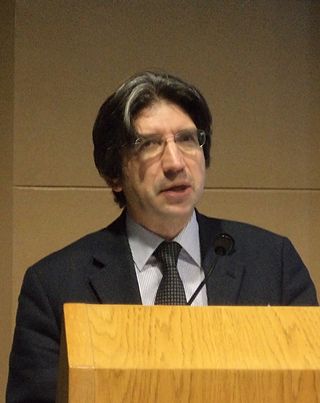
A mental disorder is an impairment of the mind disrupting normal thinking, feeling, mood, behavior, or social interactions, and accompanied by significant distress or dysfunction. The causes of mental disorders are very complex and vary depending on the particular disorder and the individual. Although the causes of most mental disorders are not fully understood, researchers have identified a variety of biological, psychological, and environmental factors that can contribute to the development or progression of mental disorders. Most mental disorders result in a combination of several different factors rather than just a single factor.

Attention deficit hyperactivity disorder (ADHD) is a neurodevelopmental disorder characterised by executive dysfunction occasioning symptoms of inattention, hyperactivity, impulsivity and emotional dysregulation that are excessive and pervasive, impairing in multiple contexts, and otherwise age-inappropriate.
Peter Roger Breggin is an American psychiatrist and critic of shock treatment and psychiatric medication and COVID-19 response. In his books, he advocates replacing psychiatry's use of drugs and electroconvulsive therapy with psychotherapy, education, empathy, love, and broader human services.
Biological psychiatry or biopsychiatry is an approach to psychiatry that aims to understand mental disorder in terms of the biological function of the nervous system. It is interdisciplinary in its approach and draws on sciences such as neuroscience, psychopharmacology, biochemistry, genetics, epigenetics and physiology to investigate the biological bases of behavior and psychopathology. Biopsychiatry is the branch of medicine which deals with the study of the biological function of the nervous system in mental disorders.
Adult Attention Deficit Hyperactivity Disorder is the persistence of attention deficit hyperactivity disorder (ADHD) in adults. It is a neurodevelopmental disorder, meaning symptoms must have been present in childhood except for when ADHD occurs after a traumatic brain injury. Specifically, multiple symptoms must be present before the age of 12, according to DSM-5 diagnostic criteria. The cutoff age of 12 is a change from the previous requirement of symptom onset, which was before the age of 7 in the DSM-IV. This was done to add flexibility in the diagnosis of adults. ADHD was previously thought to be a childhood disorder that improved with age, but recent research has disproved this. Approximately two-thirds of childhood cases of ADHD continue into adulthood, with varying degrees of symptom severity that change over time, and continue to affect individuals with symptoms ranging from minor inconveniences to impairments in daily functioning.

The Institute of Psychiatry, Psychology & Neuroscience (IoPPN) is a leading centre for mental health and neuroscience research, education and training in Europe. It is dedicated to understanding, preventing and treating mental illness, neurological conditions, and other conditions that affect the brain. The IoPPN is a faculty of King's College London, England, and was previously known as the Institute of Psychiatry (IoP).
Cognitive disengagement syndrome (CDS) is an attention syndrome characterised by prominent dreaminess, mental fogginess, hypoactivity, sluggishness, slow reaction time, staring frequently, inconsistent alertness, and a slow working speed. To scientists in the field, it has reached the threshold of evidence and recognition as a distinct syndrome.

Russell Alan Barkley is a retired American clinical neuropsychologist who was a clinical professor of psychiatry at the VCU Medical Center until 2022 and an author of books on attention-deficit hyperactivity disorder (ADHD). Involved in research since 1973 and a licensed psychologist since 1977, he is an expert on ADHD and has devoted much of his scientific career to studying ADHD and related fields like childhood defiance. He proposed the renaming of sluggish cognitive tempo (SCT) to concentration deficit disorder (CDD) and later cognitive disengagement syndrome (CDS).
Attention deficit hyperactivity disorder predominantly inattentive, is one of the three presentations of attention deficit hyperactivity disorder (ADHD). In 1987–1994, there were no subtypes and thus it was not distinguished from hyperactive ADHD in the Diagnostic and Statistical Manual (DSM-III-R).

Despite the scientifically well-established nature of attention deficit hyperactivity disorder (ADHD), its diagnosis, and its treatment, each of these has been controversial since the 1970s. The controversies involve clinicians, teachers, policymakers, parents, and the media. Positions range from the view that ADHD is within the normal range of behavior to the hypothesis that ADHD is a genetic condition. Other areas of controversy include the use of stimulant medications in children, the method of diagnosis, and the possibility of overdiagnosis. In 2009, the National Institute for Health and Care Excellence, while acknowledging the controversy, stated that the current treatments and methods of diagnosis are based on the dominant view of the academic literature.

Dan Joseph Stein is a South African psychiatrist who is a professor and Chair of the Dept of Psychiatry and Mental Health at the University of Cape Town, and Director of the South African MRC Unit on Risk & Resilience in Mental Disorders. Stein was the Director of UCT's early Brain and Behaviour Initiative, and was the inaugural Scientific Director of UCT's later Neuroscience Institute. He has also been a visiting professor at Mount Sinai School of Medicine in the United States, and at Aarhus University in Denmark.

Leon Eisenberg was an American child psychiatrist, social psychiatrist and medical educator who "transformed child psychiatry by advocating research into developmental problems".
Attention deficit hyperactivity disorder management options are evidence-based practices with established treatment efficacy for ADHD.
Joseph Biederman was Chief of the Clinical and Research Programs in Pediatric Psychopharmacology and Adult ADHD at the Massachusetts General Hospital and a professor of psychiatry at Harvard Medical School. Biederman was board-certified in general and child psychiatry.
Johannes Thome the Director and Chair of the Clinic and Policlinic of Psychiatry and Psychotherapy, Rostock University, Germany, and Honorary Professor at The School of Medicine, Swansea University, Wales, UK.
The following outline is provided as an overview of and topical guide to psychiatry:
Psychiatry is, and has historically been, viewed as controversial by those under its care, as well as sociologists and psychiatrists themselves. There are a variety of reasons cited for this controversy, including the subjectivity of diagnosis, the use of diagnosis and treatment for social and political control including detaining citizens and treating them without consent, the side effects of treatments such as electroconvulsive therapy, antipsychotics and historical procedures like the lobotomy and other forms of psychosurgery or insulin shock therapy, and the history of racism within the profession in the United States.
Bernard Timothy Walsh is an American psychiatrist, academic, author, and editor who specializes in eating disorders. He is the William and Joy Ruane Professor of Pediatric Psychopharmacology in the Department of Psychiatry at Columbia University.
Ming Tso Tsuang is an American psychiatrist and Distinguished Professor of Psychiatry at the University of California, San Diego. He is considered a pioneering researcher in the genetic epidemiology of schizophrenia and other severe mental disorders. Tsuang has authored and co-authored more than 600 publications and serves as founding and senior editor of the American Journal of Medical Genetics Part B.

Jan K. Buitelaar is a Dutch medical doctor, psychiatrist, author, and academic. He is a professor of psychiatry and child and adolescent psychiatry at Radboud University Medical Centre and former Head of Child and Adolescent Psychiatry at Karakter Child and Adolescent Psychiatry.








